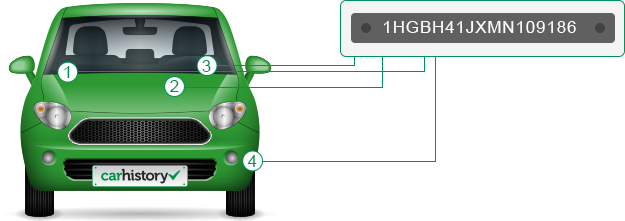
The vehicle identification number (VIN) is composed of 17 characters (digits and capital letters) that act as a unique identifier for the vehicle. A VIN displays the car's unique features, specifications and manufacturer.
The VIN can be found in a couple of places including on the car's registration label (1), on the compliance plate in the engine bay (2) or on the passenger side windshield (3), or on one of the door posts (where the door latches when it is closed) (4). See the image below:
Looking for the best place to buy a used car? You have a few options: private sellers, dealerships, and auctions. In this article, we'll explore each option, highlight their pros and cons, and give you useful tips to help you get the car you're after at a price that suits your budget.
Private sellers are people who sell their own used cars directly to buyers. You can find them on online car sale websites, noticeboards, and community groups or by simply keeping an eye out for 'For Sale' signs on cars during your daily travels.
To buy from a private seller, you'll need to contact them and arrange a time for an inspection. It's a good idea to do your research beforehand so you know what to ask and what to look for. Once you've found a car you like, you'll need to negotiate the price with the seller and arrange payment and transfer of ownership.
One of the major advantages of private sellers is that they often offer lower prices than dealerships. This is because they don't have overhead costs or sales targets to reach, which makes them more flexible and willing to negotiate on price.
However, it's important to be aware of the potential risks involved when buying from a private seller. There is a higher chance of buying a car with hidden problems or undisclosed issues. Additionally, private sellers generally don't provide warranties or guarantees.
Used car dealerships are another option offering several perks private sellers don’t, such as:
The downside of buying from dealerships is that you often pay a premium. Dealerships need to cover overhead costs and make a profit, which can limit your negotiating room. Trade-in rates may also be lower than what you could get by selling privately. And while salespeople can be helpful, they can make you feel some pressure to make a decision.
Buying a demonstration (demo) car can give you the best of both the used and new car worlds. Demo models are cars that were used as test-drive vehicles or by dealership employees, so they're typically driven less frequently and in good condition. And because they aren’t brand new, you could save a lot of money compared to buying a new car. To find demo models near you, you can search car sale websites or check out new car dealers.
Car auctions are events where a range of cars are sold to the highest bidder. These auctions can be held in person or online. Typically, cars sold at auctions come from a variety of places, such as government agencies, fleet companies, finance repossessions, and trade-ins.
If you're looking for a good deal on a car, car auctions can be a great option. They offer a large selection of vehicles to choose from, and you can easily access detailed information about the car's condition and service history reports.
One downside is that the inspection periods can be short, so you may have less time than you'd like to research and test drive the car before making a decision. Additionally, because auctions are competitive, prices can sometimes be driven up, making some cars too expensive for your budget. Finally, keep in mind that cars sold at auctions generally do not come with warranties or guarantees.
Ultimately, the choice of where to buy your used car comes down to your personal preferences. And regardless of which option you choose, it’s important to remember to do your research, ask the right questions, and be prepared for the buying process.
Get the most comprehensive report on a used car in Australia in seconds. All you need are details of the car registration or VIN.